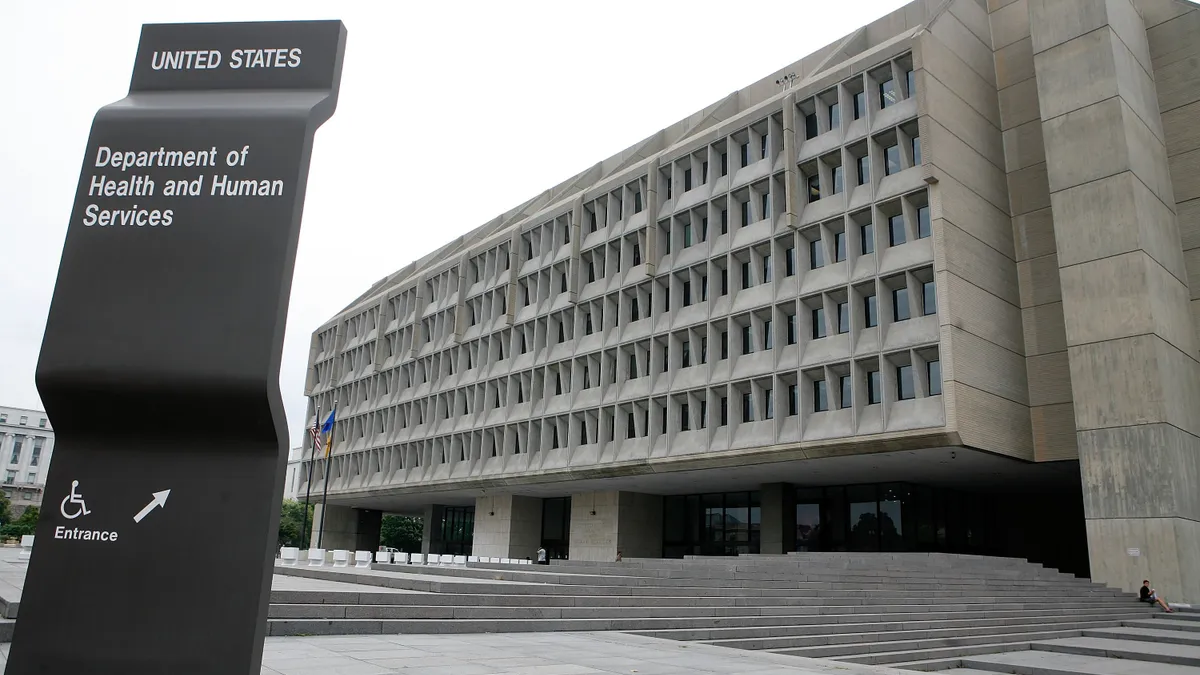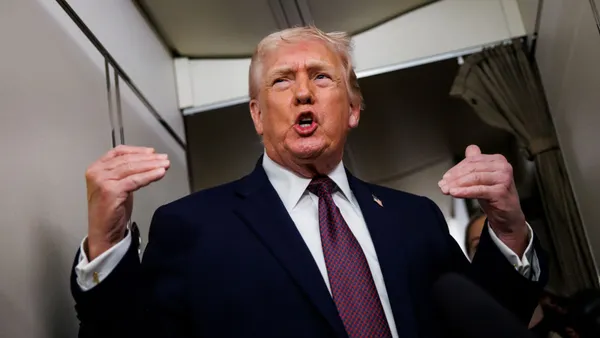Dive Brief:
- The HHS is arguing it can go ahead with firing almost 1,000 employees, despite a judge pausing the layoffs of federal workers during the government shutdown.
- The 982 HHS employees who received reduction-in-force notices are not represented by the unions that filed the court cause seeking to halt the layoffs, Thomas Nagy, the HHS’ head of personnel, said in a court filing Friday. Therefore, the temporary restraining order granted by a California Northern District judge on Wednesday doesn’t apply, Nagy argued.
- In her order, Judge Susan Illston said the case brought by the American Federation of Government Employees and the American Federation of State, County and Municipal Employees was likely to succeed given the Trump administration’s actions appear politically motivated and illegal.
Dive Insight:
The U.S. government is careening into the fourth week of a shutdown, with Democrats and Republicans at an impasse over the future of more generous subsidies for Affordable Care Act plans. The expanded financial assistance is set to expire at the end of this year with significant implications for millions of Americans. Democrats are pushing for movement on the issue as a condition of reopening the government, while Republicans argue the issue should be punted until after.
Negotiations between the two sides have largely ground to a halt. The Senate will vote on the GOP’s clean funding bill this afternoon for the 11th time, according to Politico. The vote is expected to fail again.
President Donald Trump and Russell Vought, the head of the Office of Management and Budget, said in advance of a shutdown that they planned to use the lapse in congressional appropriations to lay off more government workers, especially those working on “Democrat-oriented” priorities.
The administration followed through on its threat. Roughly 1,760 HHS employees received layoff notices on Oct. 10, with the reduction-in-force concentrated at the Centers for Disease Control and Prevention. However, the department only intended to issue 982 RIF notices, Nagy said in the Friday filing.
The erroneous notices have since been rescinded. But they included workers responsible for putting out the CDC’s vaunted Morbidity and Mortality Weekly Report, those coordinating the nation’s measles response and staff working on Ebola outbreak response in the Democratic Republic of Congo. Epidemic intelligence service officers, who investigate disease outbreaks, were also affected, according to the New York Times.
The shutdown-driven layoffs are “unprecedented in our country’s history,” Illston wrote in her order enjoining the Trump administration from implementing the RIFs.
“A temporary restraining order is appropriate because plaintiffs are likely to prevail on the merits of their claims,” the judge wrote, adding later: “If what plaintiffs allege is true, then the agencies’ actions in laying off thousands of public employees during a government shutdown — and in targeting for RIFs those programs that are perceived as favored by a particular political party — is the epitome of hasty, arbitrary and capricious decisionmaking.”
However, HHS workers are still susceptible to the layoffs, as the AFSCME doesn’t represent any employees in the department, according to Nagy’s filing. Though the CDC used to have AFGE bargaining units, the HHS terminated their collective bargaining agreements in August, Nagy added.
As a result, the “HHS has not issued any RIF notices implicated by the court’s [temporary restraining order,]” Nagy said in the filing.
Prior to Trump assuming office in January, the HHS employed roughly 82,000 people. Since then, the department’s staff has been whittled down to about 79,700 people due to the administration pushing voluntary resignations along with layoffs in the spring.
Thirty-two thousand of those workers are currently on furlough due to the shutdown. The HHS has also significantly pared back its operations, including halting oversight of research grants and contracts, pausing data collection and analysis and not responding to public requests for information.
Federal healthcare programs, including Medicare, Medicaid and the Children’s Health Insurance Program, are mandatory and will be mostly unaffected by a brief shutdown.
But along with halting Medicare funding for telehealth and hospital-at-home services, the shutdown has caused significant uncertainty for doctors after the CMS said last week it would pause all Medicare payments to physicians. Regulators quickly rolled back the statement and said they would continue to process and pay most claims.













